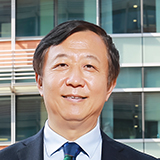May 2021 | Volume 22 No. 2
Global Thinker Acts Locally
Professor Peng Gong likes to push at traditional boundaries. As an Earth scientist, he has published in the medical journal The Lancet and developed research programmes that look at multiple contributors to climate change and biodiversity loss, such as human transportation systems and urbanisation.
He is taking a similarly broad-minded approach to his new position as Vice- President and Pro-Vice-Chancellor (Academic Development), where he succeeds Professor Terry Au Kit-fong. His official duties are to recruit world-class faculty, facilitate a culture of academic excellence and enable faculty to succeed at every stage in their careers, but he sees a higher purpose.
“I’ve been observing Hong Kong for some time and I noticed that since 1997, its higher education has been booming and expanding, but the city itself has stayed with its traditional role as a finance and trade centre. It hasn’t taken much advantage of innovative technologies. I feel universities could fill some of the gaps and engage better with the development of the city,” he said.
“I’m also curious to see how universities are related to local development. At this stage in my career, I also want to make more direct contributions.”
That career has taken Professor Gong from China to North America and back. He obtained his PhD from the University of Waterloo in Canada, joined the University of California, Berkeley, in 1994 and became full professor in 2001. In 2016, he became the founding Chair of the Department of Earth System Science at Tsinghua University, and Dean of Science in 2017.
At Tsinghua, one of his key achievements was to break down disciplinary barriers to embrace atmospheric science, oceanography, ecology, geography, computer science – just about everything relating to land and the environment. Economics became of interest, too, as well as the public health impact of pollution, biodiversity loss and climate change. In 2018 he was also appointed as the only Chinese member of the advisory board of Future Earth, a United Nations-affiliated research programme that is aiming to build knowledge and solutions to the biggest challenges to global sustainability.
Many attractions
Despite the diversity of his interests, he has been singular about his motivation, which he also brings to his new position: “I have the whole Earth in my heart and in my mind. That is a unique perspective that I hope I will be able to contribute to this great university of HKU.”
A global outlook underpins Professor Gong’s ideas about recruitment. He believes attracting top-flight academics from around the world is essential to HKU’s success – and that HKU and Hong Kong itself have the attractions to achieve that.
“The culture and spirit of the city, its diversity and global networks, are all conditions that a lot of other places are lacking,” he said. “Hong Kong is still the most unique and culturally diverse city in China. It also has a legacy of giving strong support to higher education. All of this will help us attract world-class talents.”
HKU’s strong standing in the world is also a draw, although he recognises that the University could do more to improve its infrastructure and sharpen its focus. The Senior Management Team are now working on those goals to aid its recruitment of the world’s best scholars.
“We want to support sunrise disciplines that can push the frontiers of knowledge. Every department will know who are best in their field. We need the whole University to act and welcome those who are strong,” he said.
Professor Gong also hopes to streamline procedures to make things easier for staff. “My impression is the University runs very well. The staff are professional, everyone knows their role and people support each other in a very nice way. When I told colleagues overseas that I was coming here, they had good words to say about HKU,” he said.
“I’m excited to be here and I want to learn and work with colleagues at HKU to make it even better and hopefully make people happier.”
We want to support sunrise disciplines that can push the frontiers of knowledge. Every department will know who are best in their field. We need the whole University to act and welcome those who are strong.

PROFESSOR PENG GONG

